|
|
|
Sort Order |
|
|
|
Items / Page
|
|
|
|
|
|
|
| Srl | Item |
| 1 |
ID:
162446


|
|
|
|
|
| Summary/Abstract |
The foreign policy behavior of North Korea remains puzzling to many observers
to date. This article aims to explain Pyongyang’s foreign behavior between 1995
and 2011 with a concept called the balance of dependence. Although it stood on
the brink of collapse in the 1990s, the North Korean regime defied the odds and
survived with the help of neighboring countries, namely South Korea, Japan, China,
Russia, and the United States. This article intends to explain Pyongyang’s foreign
policy under Kim Jong Il by focusing on how it deliberately built a portfolio of
dependence on its neighbors. I argue that North Korea’s foreign behavior had been
attuned to the rise and fall of assistance from other nations. It sought to disperse its
dependence among a host of potential sponsors in order not to be exclusively reliant
on a single donor state, fearing restrictions on its political autonomy. As long as its
neighbors are willing to help out, Pyongyang will continue to play one sponsor off
the others while making progress with its nuclear and missile programs.
|
|
|
|
|
|
|
|
|
|
|
|
|
|
|
|
| 2 |
ID:
163825
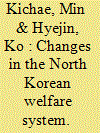

|
|
|
| 3 |
ID:
118950
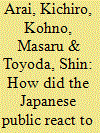

|
|
|
|
|
| Publication |
2013.
|
| Summary/Abstract |
We present a comprehensive evidence on how the Japanese reacted to the sudden death of North Korea's Kim Jong Il in December 2011, which was an event of enormous significance for Japan's national security. Based on our original, partially panel-structured, multi-wave monthly surveys conducted from December 2011 to March 2012, we analyze how the Japanese learned about his death, how they formed evaluations about its implication, and how their perceptions changed over time. Our findings illustrate that Japan's general public reacted in a remarkably calm and balanced way to the evolving situation, pointing to a basic sense of realism that underlies their attitudinal orientation toward North Korea. This sense, we argue, derives from the confidence widely held in Japan that, while North Korea remains one of the crucial sources of external threats, its overall ability to influence the regional and international dynamics is limited and its threat thus containable within current framework of national security.
|
|
|
|
|
|
|
|
|
|
|
|
|
|
|
|
| 4 |
ID:
120995
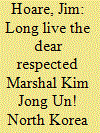

|
|
|
|
|
| Publication |
2013.
|
| Summary/Abstract |
There had long been speculation as to who would succeed Kim Jong Il, the ruler of North Korea. When he died in December 2011, it was his youngest son, Kim Jong Un who took over. Little enough is known about how N. Korea is run, but the difficulties of getting the country's leaders to modify their ways remain as great as ever. There were no obvious signs of change on the domestic front, though the military seemed somewhat less prominent. And continuity was also evident in relations with South Korea, now at a very low ebb. The issue of missile and nuclear development is equally bleak. The Leap Day Agreement with the US quickly became a dead letter, and as 2012 went on, North Korean belligerence was fuelled by UN resolutions. Much of this was routine theatre, but North Korea's third nuclear test on 12 February 2013 provoked sharper international criticism and a correspondingly shriller response from the North. In spite of calls for China to intervene, the real target for this hostility is the US. But with each side unwilling to engage except in terms that the other side finds unacceptable, it is hard to see how progress can be achieved.
|
|
|
|
|
|
|
|
|
|
|
|
|
|
|
|
| 5 |
ID:
108570


|
|
|
|
|
| Publication |
2011.
|
| Summary/Abstract |
What has happened to North Korea-China relations since autumn 2009 is nothing
less than a renewal of the alliance. This is a sea change, brought about first of all
by the deterioration of Kim Jong Il's health and then by all the resulting turmoil
of his regime's instability and difficulties. Both sides' policy behavior toward the
other became a "new game," dictated by a sort of dire emergency, and placed them
in a tightly fixed structure reducing much of the scope for a strategy adjustment.
Pyongyang's new game has been characterized prominently by volatility or a
malfunctioning of the "rational" policymaking capacity of the ailing dictator.
Volatile desperation dominates behavior in the leadership succession, in military
affairs, the nuclear arms program, its posture toward the United States and ROK,
respectively, and in its relations with China. The new game can be defined as one
between a volatile DPRK and a relatively loyal ally with an anxious strategy that
is cornered in its relations with the ROK and the United States on the North
Korean issue. China's relationship with the DPRK is the most complicated of all,
and in a sense disabling. As to China-ROK cooperation on the North Korea issue,
the above factors unfortunately dim the prospects; however, there is still reason
for optimism if efforts continue to be made to find a resolution to the problem.
|
|
|
|
|
|
|
|
|
|
|
|
|
|
|
|
| 6 |
ID:
082212
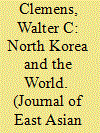

|
|
|
|
|
| Publication |
2008.
|
| Summary/Abstract |
This survey of books in English on North Korea, 1997-2007, identifies nearly 240 titles-mostly by US authors but also by authors in Australia, Europe, Japan, the Republic of Korea, and Russia. The books fall into eleven categories: history and culture; the Korean War revisited; the DPRK regime and its leaders; human rights and humanitarian issues; the economy: Juche, Songun, collapse, or reform; DPRK military assets and programs; relations with the United States; arms control negotiations and outcomes; regional and world security; prospects for North-South unification; and North Korea's future. A final section includes useful websites. This survey points to a wide interest in North Korea and underscores the serious and ongoing efforts of many scholars and policy analysts to understand developments there
|
|
|
|
|
|
|
|
|
|
|
|
|
|
|
|
| 7 |
ID:
044768
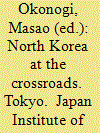

|
|
|
|
|
| Publication |
Tokyo, Japan Institute of international Affairs, 1988.
|
| Description |
196p.pbk
|
| Standard Number |
4819302000
|
|
|
|
|
|
|
|
|
|
|
|
Copies: C:1/I:0,R:0,Q:0
Circulation
| Accession# | Call# | Current Location | Status | Policy | Location |
| 030696 | 951.904/OKO 030696 | Main | On Shelf | General | |
|
|
|
|
| 8 |
ID:
071897


|
|
|
|
|
| Publication |
Jefferson, McFarland & Company Inc., 2005.
|
| Description |
v, 384p.pbk
|
| Standard Number |
078642107X
|
|
|
|
|
|
|
|
|
|
|
|
Copies: C:1/I:0,R:0,Q:0
Circulation
| Accession# | Call# | Current Location | Status | Policy | Location |
| 051284 | 951.93/SHI 051284 | Main | On Shelf | General | |
|
|
|
|
| 9 |
ID:
091880
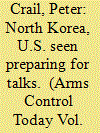

|
|
|
|
|
| Publication |
2009.
|
| Summary/Abstract |
The United States is ready to hold direct talks with North Korea on denuclearization, potentially paving the way for the Obama administration's first formal discussions with Pyongyang, U.S. officials said in September.
Department of State spokesman Philip Crowley told reporters Sept. 11 that the United States is "prepared to enter into a bilateral discussion with North Korea." He added that such talks would be "designed to convince North Korea to come back to the six-party process and to take affirmative steps towards denuclearization."
|
|
|
|
|
|
|
|
|
|
|
|
|
|
|
|
| 10 |
ID:
113878


|
|
|
|
|
| Publication |
2012.
|
| Summary/Abstract |
Focusing on the early stage, this paper compares the Kim Il Sung-Kim Jong Il succession with the Kim Jong Il-Kim Jong Un succession. Analyzing their differences and similarities, the study attempts to provide a better understanding of the leadership formation of Kim Jong Un, who now rules North Korea.
|
|
|
|
|
|
|
|
|
|
|
|
|
|
|
|
| 11 |
ID:
086463


|
|
|
|
|
| Publication |
2008.
|
| Summary/Abstract |
Over the past decade, North Korea has been undergoing a severe economic crisis, resulting in extreme food shortages, and this has inflicted great suffering upon the North Korean people. Given such dire realities in the country, it is beyond all doubt that the North Korean government must carry out comprehensive economic reforms as quickly as possible, in order to transform North Korea's present inefficient socialist planned economic system into a market economy. Many, including myself, are of the view that economic reform would certainly lead to successful economic growth in North Korea, and this would in turn enhance the legitimacy of the North Korean regime itself. Nonetheless, the regime has consistently avoided carrying out economic reform, despite being presented with many good opportunities to succeed in doing so. The July First reforms of 2002 have been half-heartedly and inconsistently applied. This then raises a simple, but very important, question: Why has the North Korean government consistently avoided adopting comprehensive economic reforms? The present study pinpoints North Korea's unique monolithic system of political control and policymaking, which has the highest level of power concentration in one individual of all political systems, as the biggest barrier to economic reform. Despite the dire need for reform, the current North Korean regime has avoided it for fear of undermining this monolithic system.
|
|
|
|
|
|
|
|
|
|
|
|
|
|
|
|
| 12 |
ID:
065102


|
|
|
|
|
| Publication |
Oxford, Oxford University Press, 2005.
|
| Description |
xiv, 300p.hbk
|
| Standard Number |
019517044X
|
|
|
|
|
|
|
|
|
|
|
|
Copies: C:1/I:0,R:0,Q:0
Circulation
| Accession# | Call# | Current Location | Status | Policy | Location |
| 050022 | 951.93043/BEC 050022 | Main | On Shelf | General | |
|
|
|
|
| 13 |
ID:
097112
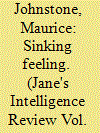

|
|
|
| 14 |
ID:
119051
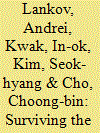

|
|
|
|
|
| Publication |
2013.
|
| Summary/Abstract |
The article deals with the everyday survival strategies employed by the workers of (largely non-functioning) state enterprises in post-socialist North Korea, and with the social changes this group has dealt with in the last two decades. It also compares these trends with the experiences of post-socialist Eastern Europe. In the 1990s the economic role of the North Korean state decreased dramatically. Official wages could no longer guarantee the physical survival of the populace, so workers from state industries engaged in a multitude of economic activities which were (and still are) largely related to the booming "second economy." These activities include private farming, employment in semi-legal and illegal private workshops, trade and smuggling, as well as small-scale business activities. The choice of a particular activity depends on a number of factors, of which network capital is especially significant. Income is also augmented by the illegal use of state resources and widespread theft of material and spare parts from state-owned factories. As a result of these changes, the industrial working class of North Korea, once a remarkably homogenous group, has fragmented, and its members have embarked on vastly different social trajectories.
|
|
|
|
|
|
|
|
|
|
|
|
|
|
|
|
| 15 |
ID:
107391


|
|
|
|
|
| Publication |
2011.
|
| Summary/Abstract |
The United States and North Korea held their first high-level meeting in nearly two years in July as part of efforts to restart multilateral talks on North Korea's nuclear program.
|
|
|
|
|
|
|
|
|
|
|
|
|
|
|
|
| 16 |
ID:
095759


|
|
|
|
|
| Publication |
2010.
|
| Summary/Abstract |
The relationship between America and North Korea is wavering between confrontation and communication depending on the policy choices of President Obama and Kim Jong Il. To have a realistic outlook upon the situation, it would be of significant value to categorize the relationship and to determine the South Korean government's countermeasures based on these categories. Based on the U. S.-North Korea relationship, four categories can be extracted. Soft-line and hard-line policies are possible political choices, and scenarios will be put forward based on a mixture of the two. South Korea's response to each category is reviewed in this paper.
|
|
|
|
|
|
|
|
|
|
|
|
|
|
|
|
|
|
|
|
|